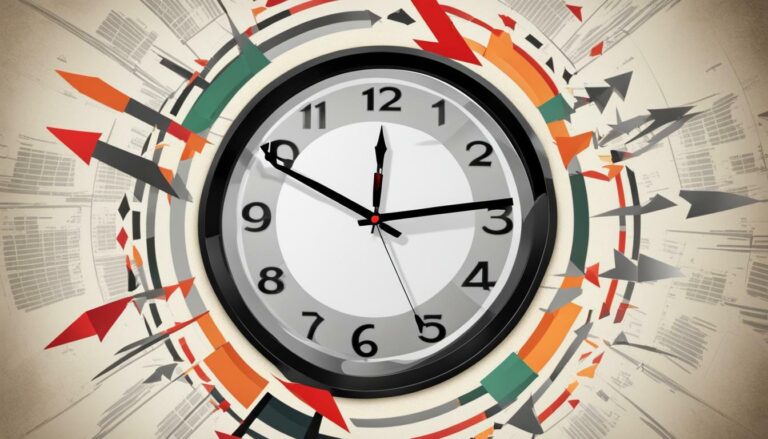When does Chase report to credit bureaus? – Understand the Process.

If you’re wondering when Chase reports to credit bureaus, it’s essential to have a clear understanding of the process and how it can impact your credit score in the USA.
Key Takeaways:
- Chase reports to the three main credit bureaus (Experian, Equifax, and TransUnion) on a monthly basis.
- Information such as credit limits, account balances, and payment history is reported.
- The timing of when the information is updated on your credit report may vary, but it usually takes a few days after the end of your monthly billing period.
- New Chase cardholders may need to wait one or two billing periods to see their account information reflected on their credit report.
- To improve your credit score, it is recommended to maintain a zero balance on your credit cards or keep your balances below 30% of each card’s credit limit.
- Significant improvements in your credit score take time and consistent effort.
Chase’s Monthly Reporting Cycle
Chase Bank reports to the three main credit bureaus – Experian, Equifax, and TransUnion – on a monthly basis to provide them with updated information about your credit activities. This includes details such as credit limits, account balances, and payment history. The frequency at which Chase reports to the credit bureaus is an important factor to understand in order to stay informed about your credit report.
After the end of your monthly billing period, it typically takes a few days for the updated information to be reflected on your credit report. However, please note that the exact timing may vary. It’s important to regularly review your credit report to ensure accuracy and address any discrepancies that may arise.
If you are a new Chase cardholder, it may take one or two billing periods for your account information to appear on your credit report. This delay allows for the necessary processing time to ensure that accurate and up-to-date information is provided to the credit bureaus.
| Reporting Bureaus | Reporting Frequency |
|---|---|
| Experian | Monthly |
| Equifax | Monthly |
| TransUnion | Monthly |
Maintaining good credit habits is essential to improve your credit score. To enhance your creditworthiness, it is recommended to keep your credit card balances below 30% of each card’s credit limit or, ideally, maintain a zero balance. This responsible credit utilization demonstrates your ability to manage credit and can positively impact your credit score over time.
🚨 TUIC Errors + Low Credit Score?
CreditScoreIQ helps you build credit faster by reporting utility bills to all 3 bureaus—while you dispute errors.
Start Building Credit Today →Remember that improving your credit score takes time and consistent effort. It’s crucial to make timely payments, minimize your debt, and avoid applying for multiple lines of credit within a short period. By understanding Chase’s monthly reporting cycle and taking the necessary steps to maintain good credit habits, you can work towards a stronger credit profile.
Timeline for Credit Report Updates
After the end of your monthly billing period, it usually takes a few days for Chase’s reported information to reflect on your credit report. This means that any changes in your credit card balances, credit limits, or payment history will not be immediately updated on your credit report. It’s important to keep in mind that the exact timing may vary slightly based on factors such as weekends and holidays.
If you’re monitoring your credit report closely, it’s recommended to give it a few days after the end of your billing period before checking for any updates. This will allow enough time for Chase to report the necessary information to the credit bureaus and for them to update your credit report accordingly.
For new Chase cardholders, it’s important to note that it may take one or two billing periods for your account information to be reflected on your credit report. This is because it takes time for the credit bureaus to receive and process the information from Chase. So, if you’ve recently opened a Chase credit card, don’t be alarmed if you don’t see your new account listed on your credit report right away. Simply give it some time, and it will eventually appear.
| Credit Bureau | Credit Report Update Frequency |
|---|---|
| Experian | Every 30 days |
| Equifax | Every 30 days |
| TransUnion | Every 30 days |
Remember, the frequency at which Chase reports to the credit bureaus aligns with their monthly reporting cycle. This means that your credit report will be updated approximately every 30 days. It’s essential to understand this timeline to effectively manage your credit and ensure you have the most accurate and up-to-date information on your credit report.
New Cardholders and Credit Reporting
If you’re a new Chase cardholder, it may take one or two billing periods before your account information appears on your credit report. This means that your credit report may not reflect your new Chase credit card right away. It’s important to keep this in mind if you’re applying for new credit or loans shortly after receiving your Chase card.
During these initial billing periods, it’s a good idea to use your Chase credit card responsibly and make regular, on-time payments. This will help establish a positive payment history, which is an important factor in building a strong credit score. Keep track of your due dates and pay off your balance in full, or at least keep it below 30% of your credit limit, to show responsible credit usage.
Remember, credit reporting is not an instant process. It takes time for your account information to be updated and reflected on your credit report. So, even if you’re not seeing your new Chase credit card on your credit report immediately, continue to practice good credit habits and give it some time. With consistent effort, you’ll start to see the positive impact on your credit score.
| Key Points | Action |
|---|---|
| Be patient | Wait one or two billing periods for your account information to appear on your credit report |
| Use your credit card responsibly | Make regular, on-time payments and keep your balance below 30% of your credit limit |
| Practice good credit habits | Consistently demonstrate responsible credit usage over time |
Factors Affecting Credit Score
Chase’s reporting to credit bureaus plays a significant role in determining your credit score, so it’s crucial to understand the impact of your credit habits on your overall financial health. The information reported by Chase, such as credit limits, account balances, and payment history, is used by credit bureaus to calculate your credit score. Here are some important factors to consider:
Credit Utilization
One of the key factors that can affect your credit score is your credit utilization ratio, which is the percentage of your available credit that you are currently using. To maintain a good credit score, it is recommended to keep your credit card balances below 30% of each card’s credit limit. This shows lenders that you are responsible with credit and not relying too heavily on borrowed funds.
Payment History
Your payment history is another crucial factor that Chase and credit bureaus consider when calculating your credit score. Late payments, missed payments, or defaulting on debts can have a significant negative impact. It’s important to make all your payments on time to demonstrate your reliability as a borrower. Setting up automatic payments or reminders can help you stay on track and avoid any potential negative marks on your credit report.
Credit Age and Mix
The length of your credit history and the types of credit you have also play a role in determining your credit score. Having a longer credit history shows lenders that you have experience managing credit over time, which can be seen as less risky. Additionally, having a diverse mix of credit accounts, such as credit cards, loans, and mortgages, can demonstrate your ability to handle different types of debt responsibly.
| Factors Affecting Credit Score | Impact on Credit Score |
|---|---|
| Credit Utilization | High utilization can lower your score |
| Payment History | Positive payments improve score, while late or missed payments hurt it |
| Credit Age and Mix | Longer credit history and diverse credit portfolio can positively impact score |
In summary, maintaining good credit habits is essential for a healthy credit score. By keeping your credit utilization low, making timely payments, and having a mix of credit accounts, you can improve your creditworthiness and increase your chances of being approved for future credit applications. Remember, it takes time and consistent effort to see a significant improvement in your credit score, so it’s important to practice responsible credit management over the long term.
Tips to Improve Your Credit Score
To enhance your credit score, strive to maintain a zero balance on your credit cards or keep your balances below 30% of each card’s credit limit, as reported by Chase to the credit bureaus. This will help demonstrate responsible credit usage and financial management, positively impacting your creditworthiness.
Pay Your Bills on Time
One of the most significant factors influencing your credit score is your payment history. Late payments or missed payments can have a detrimental effect on your creditworthiness. To maintain a good credit score, make sure to pay all your bills, including credit card payments, on time each month.
Diversify Your Credit Types
Holding a variety of credit accounts, such as credit cards, loans, and mortgages, can have a positive impact on your credit score. Lenders like to see that you can manage different types of credit responsibly. However, be cautious about opening too many credit accounts simultaneously, as this can negatively affect your credit score.
Regularly Monitor Your Credit Report
It’s essential to regularly check your credit report for errors or fraudulent activities that could be affecting your credit score. You can request a free credit report from each of the three major credit bureaus: Experian, Equifax, and TransUnion, once a year. Review your report carefully, ensuring all the information is accurate and up-to-date. If you find any errors, dispute them with the credit bureaus to have them corrected promptly.
| Credit Score Range | Credit Rating |
|---|---|
| 800-850 | Exceptional |
| 740-799 | Very Good |
| 670-739 | Good |
| 580-669 | Fair |
| 300-579 | Poor |
Remember that improving your credit score takes time and consistent effort. If you follow these tips and maintain responsible credit habits, you can gradually increase your creditworthiness and enjoy the benefits of a higher credit score.
Conclusion
Understanding when Chase reports to credit bureaus is crucial for managing your credit responsibly and maintaining a healthy credit score. Chase Bank reports your credit information, such as credit limits, account balances, and payment history, to the three main credit bureaus – Experian, Equifax, and TransUnion – on a monthly basis.
The timing of when this information is updated on your credit report may vary, but it typically takes a few days after the end of your monthly billing period. It’s important to note that if you are a new Chase cardholder, it may take one or two billing periods before your account information is reflected on your credit report.
To improve your credit score, it is recommended to maintain a zero balance on your credit cards or keep your balances below 30% of each card’s credit limit. This demonstrates responsible credit utilization and can positively impact your creditworthiness. However, it’s important to remember that improving your credit score takes time and consistent effort. Don’t expect instant results; instead, focus on maintaining good credit habits and making timely payments.
In summary, understanding Chase’s credit bureau reporting policy and the frequency at which they report to credit bureaus is essential for managing your credit effectively. By monitoring your credit report regularly and practicing responsible credit behavior, you can take control of your financial health and work towards achieving your credit score goals.
FAQ
When does Chase report to credit bureaus?
Chase reports to the three main credit bureaus (Experian, Equifax, and TransUnion) on a monthly basis.
What information does Chase report to credit bureaus?
Chase reports information such as credit limits, account balances, and payment history to the credit bureaus.
How often is my credit report updated with Chase’s information?
The timing of when the information is updated on your credit report may vary, but it typically takes a few days after the end of your monthly billing period.
Do new Chase cardholders see their account information reflected on their credit report immediately?
It may take one or two billing periods for new Chase cardholders to see their account information reflected on their credit report.
What factors can affect my credit score?
Chase’s credit reporting can impact your credit score. It is recommended to maintain a zero balance on your credit cards or keep your balances below 30% of each card’s credit limit.
What are some tips to improve my credit score?
To improve your credit score, it is recommended to maintain good credit habits and adhere to Chase’s credit bureau reporting policy.
Source Links
- https://www.chase.com/personal/credit-cards/education/credit-score/how-often-is-credit-score-updated
- https://wallethub.com/answers/cc/when-does-chase-report-to-credit-bureaus-2140746958/
- https://donotpay.com/learn/when-does-chase-report-to-credit-bureaus/
Ready to Improve Your Credit?
Disputing TUIC errors is step one. Step two? Boost your score by reporting utility payments with CreditScoreIQ.
Get Started Now (Only $1 Trial) →3-bureau reporting • $1M identity insurance • Dark web monitoring





